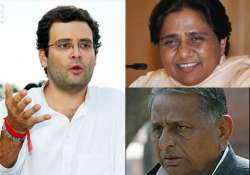Rahul Predicted, SP, BSP Will Break Up In 10-15 Years : WikiLeaks
New Delhi, Sept 6 : Congress general secretary Rahul Gandhi told a senior US diplomat soon after the 2009 Lok Sabha poll victory that caste-based parties like Samajwadi Party and BSP will “crack up” in

New Delhi, Sept 6 : Congress general secretary Rahul Gandhi told a senior US diplomat soon after the 2009 Lok Sabha poll victory that caste-based parties like Samajwadi Party and BSP will “crack up” in 10 to 15 years, Times of India reported.
In a US cable put out by WikiLeaks, Gandhi had told a senior US diplomat that almost 20% of the Congress-led United Progressive Alliance (UPA) Lok Sabha members were under 45 years old although he said younger members should not expect Cabinet seats immediately.
Following the success of his youth policy in the Punjab election, Gandhi said he would try a similar approach in Gujarat and Tamil Nadu, and eventually across India.
Responding to the question about why Congress decided to go it alone in contesting Lok Sabha seats in Uttar Pradesh and Bihar, he stressed it was vital to rebuild the party structure in the two states.
Congress's strength had collapsed in these states as caste and community-based parties gained strength. “But these parties did not have a future, in Gandhi's view,” the cable said.
A “revolt from below”” against the caste superstructure of parties like SP and BSP created opportunities for Congress.
While he admired Bihar chief minister Nitish Kumar for showing good governance mattered, Gandhi dismissed many parties as being essentially “one man”” structures and looking into the future 10 to 15 years, he asserted that many of the caste-based parties would “”crack up”.
This would be “because of dissatisfaction with caste as an organizing principle and voters' rising expectations of better governance. Looking 30 years ahead, he predicted that Indian voters will act much like their counterparts in developed countries and vote based on their pocketbook or on other salient individual interests.”
In another interaction, Gandhi discussed the US engagement in Iraq and had read reports of the possibility of a pro-Iran, Shia-dominated democracy, which is “obviously not acceptable to the Americans”.
On Hamas's win in Palestine elections, Gandhi offered a comparison with a similar problem in Assam, where it for years battled a separatist insurgency.
The Indian strategy, he pointed out, was to allow the insurgent group to form the Assam government. This “defanged and discredited” the insurgency. He envisaged that a similar outcome was possible in the Occupied Territories.